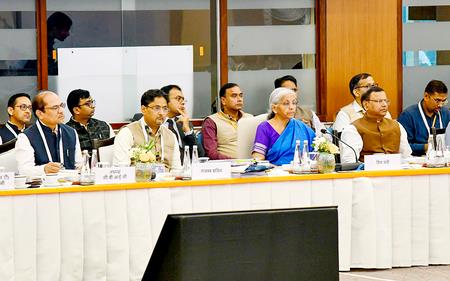GST Reforms For Msmes To Fuel Growth And Employment Across India
Multiple sectors such as garments, toys, handicrafts, leather, and MSMEs see enhanced employment opportunities, with a notable impact on women's employment in textiles, tailoring, and dairy.
For example, lower GST on two-wheelers, cars, buses, and tractors increases demand, benefiting MSMEs in tyres, batteries, glass, plastics, and electronics.
Affordable bikes support gig workers, farmers, and rural traders and cheaper cars aid MSMEs and dealerships in small towns.
GST reduction to 5 per cent on tractors (less than 1800 cc) strengthens India's global tractor manufacturing leadership and assists ancillary MSMEs. GST on commercial goods vehicles (trucks, delivery vans) has been cut from 28 per cent to 18 per cent, lowering freight, logistics costs, inflationary pressures, and benefiting MSME truck owners.
GST on buses (10+ seats) reduced from 28 per cent to 18 per cent, lowering costs for fleet operators, schools, and improving fare affordability for labourers.
GST on most food items reduced from 12 per cent/18 per cent to 5 per cent or nil, supporting MSMEs in food processing, small-scale processors, regional brands, dairy cooperatives, packaging, and cold storage.
Moreover, lower GST on chocolates, cakes, and confectionery will boost sales for small sweet makers. Dairy sector benefits from nil GST on milk and paneer, reduction from 12 per cent to 5 per cent on butter and ghee; supporting farmers, SHGs, women-led enterprises, and promoting nutrition security. GST on milk cans has been lowered from 12 per cent to 5 per cent.
GST on Man-Made Fibres has been cut from 12 per cent to 5 per cent, correcting inverted duty structure, increasing competitiveness for MSME textile manufacturers and exporters.
Readymade garments GST slab has been expanded to 5 per cent for items up to Rs 2,500 (earlier Rs 1,000), stimulating demand in Tier-2/3 towns and supporting labour-intensive garment units, especially women.
GST on leather products has been reduced from 12 per cent to 5 per cent (below Rs 2,500 per pair) - benefitting MSMEs in hides, tanneries, and footwear manufacturing.
Cement GST has been decreased from 28 per cent to 18 per cent, lowering housing costs and supporting PMAY which will boost jobs in mining, manufacturing, and logistics.
GST on agro-based wood products (rice husk board, bamboo flooring, etc.) has been reduced from 12 per cent to 5 per cent, aiding MSME wood product units.
Lower GST rates have made essential goods, raw materials, and services more affordable, motivating small and medium enterprises and start-ups to scale up operations, invest in innovation, and compete both domestically and globally.
The reforms support women-led and labour-intensive industries by making manufactured goods, processed foods, apparel, and even eco-friendly products accessible at lower costs, fostering economic inclusion of rural, semi-urban, and informal sector workers alongside urban manufacturers, said the government.
-IANS
na/

Legal Disclaimer:
MENAFN provides the
information “as is” without warranty of any kind. We do not accept
any responsibility or liability for the accuracy, content, images,
videos, licenses, completeness, legality, or reliability of the information
contained in this article. If you have any complaints or copyright
issues related to this article, kindly contact the provider above.
Most popular stories
Market Research

- What Does The Europe Cryptocurrency Market Report Reveal For 2025?
- United States Kosher Food Market Long-Term Growth & Forecast Outlook 20252033
- Utila Triples Valuation In Six Months As Stablecoin Infrastructure Demand Triggers $22M Extension Round
- Meme Coin Little Pepe Raises Above $24M In Presale With Over 39,000 Holders
- FBS Analysis Highlights How Political Shifts Are Redefining The Next Altcoin Rally
- 1Inch Becomes First Swap Provider Relaunched On OKX Wallet






















Comments
No comment